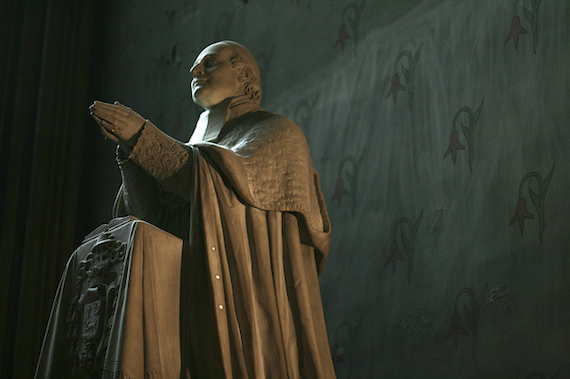
I am a writer because, as a married man, I cannot become a priest. Fittingly, I first met my wife at a priest’s rectory. Father Joe Celia made dinner each Sunday for student parishioners of St. Pius X church at Susquehanna University. Twenty students lined two tables that stretched out of the dining room and into the living room. I came for the gravy, meatballs, and garlic bread — authentic Italian cooking was in short supply in this pocket of central Pennsylvania — and for the friendship of Father Joe. I quit the college’s basketball team when I didn’t land the starting point guard spot as a freshman. My coach told me to have patience; Father Joe added that I could benefit from some humility. I didn’t listen to either of them, and would live to regret it. So goes Catholic guilt.
Father Joe reminded me that I was in college to study, not dribble. He was a patient mentor, and a saint for his willingness to read my terrible first drafts. In one story, I spent thirteen pages going step-by-step through the celebration of Mass. Father Joe gave that one back to me and said he had enough of that each weekend. Summary is sacred.
I missed my family back in New Jersey, but Father Joe’s dinners helped ease the distance. Most of the students at those dinners were weekly regulars, but one Sunday I noticed a beautiful girl sitting with friends in the living room. My first words to her were the less-than-smooth “dinner is ready.” We grew up a half hour away from each other. My AAU basketball practices and home games were played at her Catholic high school. She would run sprints for winter track while I fronted a full-court press, but we never met. It was not yet our time. But it was our time that afternoon. I did not simply fall in love; I collapsed and keeled. After dinner I told my roommate that I would marry Jen. It was an accurate prediction.
Only a few months earlier, I had made another prediction to my roommate. I was going to enter the seminary to become a priest. More specifically, I wanted to become a Jesuit. And by “entering the seminary,” I meant beginning the discernment process that preceded the long formation period. It can take nearly a decade to be ordained as a Jesuit, but they seemed like the best fit for me. They were priests, but they were also lawyers, teachers, and writers.
When I met my future wife that Sunday afternoon, I did not hear thunder. I did not shudder at betraying God. Rather, I recognized that my belief was not meant to develop into ordination. I was not meant to become a priest. I was meant to become a husband and a father. I should have trusted in my family’s history. My own father, while a student at Holy Cross College, was preparing to enter Jesuit discernment when he met my mother. Thankfully, they chose each other.
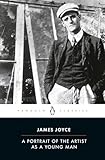 So much of faith is a matter of similar pivots and choices. Late in A Portrait of the Artist as a Young Man, Stephen Dedalus is confronted by his friend, Cranly. Dedalus does not want to attend Easter Mass, upsetting his mother. Cranly quips that it “is a curious thing, do you know…how your mind is supersaturated with the religion in which you say you disbelieve.” Dedalus, ever sensitive and defensive, stands his ground, stating that he “will not serve that in which I no longer believe whether it call itself my home, my fatherland or my church.” James Joyce’s entire canon is steeped in the Catholicism he rejected. For Stephen, and for Joyce, the poet replaces the priest. Dogma gets in the way. Transcendence is found in art. Although young Stephen dreamt of standing before a congregation, as an adult he would rather be God on the page. I love Joyce’s work, but disagree with his conclusions. He was a shrewd enough Catholic to know that Stephen’s words reflect Lucifer’s, but more importantly, they reveal a dual rejection of servitude to the Church and priestly service to the flock.
So much of faith is a matter of similar pivots and choices. Late in A Portrait of the Artist as a Young Man, Stephen Dedalus is confronted by his friend, Cranly. Dedalus does not want to attend Easter Mass, upsetting his mother. Cranly quips that it “is a curious thing, do you know…how your mind is supersaturated with the religion in which you say you disbelieve.” Dedalus, ever sensitive and defensive, stands his ground, stating that he “will not serve that in which I no longer believe whether it call itself my home, my fatherland or my church.” James Joyce’s entire canon is steeped in the Catholicism he rejected. For Stephen, and for Joyce, the poet replaces the priest. Dogma gets in the way. Transcendence is found in art. Although young Stephen dreamt of standing before a congregation, as an adult he would rather be God on the page. I love Joyce’s work, but disagree with his conclusions. He was a shrewd enough Catholic to know that Stephen’s words reflect Lucifer’s, but more importantly, they reveal a dual rejection of servitude to the Church and priestly service to the flock.
Like Joyce, I am a cradle Catholic. I have known no other creed. My childhood was suffused with rosaries, missals, crosses on chains, books about saints, nightly prayers, reflections on the pain and power of the Passion and the Resurrection, and Mass, but it was also saturated with watching the Boston Celtics and taping Hot 97 on both sides of cassettes until Biggie blurred into EPMD. New Jersey is a synthesis of Philadelphia and New York City, of Newark and the Pine Barrens. Mexican, Spanish, Italian, and Irish immigrants have created a folk Catholicism that begins in our cities but bleeds toward the suburbs, where each small parish has its own culture. Here in Jersey, The Exorcist still wounds us, but we return to it, like paying respect to a warning. Weird NJ is not simply a regional magazine; it is a way of life. The Garden State is a mixture of the real and the supernatural. We often cannot tell the difference.
Even as a boy, I knew that most devout Catholics did not enter the clergy, but I was always interested in the vocations of priests. They were very much regular men. My priest joked with parishioners after Mass, gave us pep talks before CYO games, and ate French onion soup at Houlihan’s. My interest in the vocation began with those observations, but evolved during college. I moved from studying astronomy, a theology of the stars, to literature and creative writing. Comparative literary analysis fits Catholicism well. Catholic thought is diverse and deep, from Thomas Aquinas to Jacques Maritain, Dietrich von Hildebrand, Simone Weil, Pierre Teilhard de Chardin, SJ, Walter Ong, SJ, and G.E.M. Anscombe. For me, the Bible was the ultimate text: an amalgamation of literary forms, a work that demanded attention, elicited contrasting reactions, and always seemed to reveal fresh meanings after re-readings. It was that intellectual pull, coupled with the beauty of ritual and the opportunity to offer spiritual support to a community that made me want to become a priest.
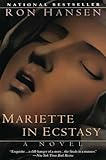
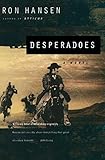 When I say that I cannot become a priest because I am married, I do not mean to simplify that statement, or to offer it as a complaint. If I were able to become a priest now, that decision would not be my own; it would belong to my wife. And that is one tremendous hypothetical. Catholics know Pope Francis is brilliant, compassionate, and not interested in changing doctrine. My personal desire to become a priest does not alone warrant revision of clerical celibacy. But I remain a practicing Catholic. You might call me an elapsed Catholic, to satisfy the jokes of my lapsed friends. My doubts have never been about God, but about the mechanisms of the Church, the institutional sins. Yet I have been blessed with the acquaintance of wonderful priests like Father Joe. Perhaps I am spoiled, but I have seen priests live as writers. The novelist Ron Hansen, while not a priest, is a deacon in the San Jose diocese. A lifelong Catholic who attended daily Mass, Hansen’s earliest novels were historical westerns, including Desperados and The Assassination of Jesse James by the Coward Robert Ford. He explains that his earlier subject matter was the result of following T.S. Eliot’s critical precept of the “wholesale subtraction of my own personality and the submersion of my familial and religious experiences.” “Frustrated” that his fiction “did not more fully communicate a belief in Jesus as Lord that was so important, indeed central, to my life,” Hansen wrote Mariette in Ecstasy, a novel about a stigmatic seventeen year-old woman who enters a convent in upstate New York. Ever since, Hansen has not shied from engaging the mysteries of faith, but believes that fiction writers “can safely leave evangelizing to the evangelists.” I appreciate that sentiment. I have never hid my belief, but do not compel others to follow my faith. Like Luke Ripley in Andre Dubus’s wonderful “A Father’s Story,” I “have no missionary instincts.”
When I say that I cannot become a priest because I am married, I do not mean to simplify that statement, or to offer it as a complaint. If I were able to become a priest now, that decision would not be my own; it would belong to my wife. And that is one tremendous hypothetical. Catholics know Pope Francis is brilliant, compassionate, and not interested in changing doctrine. My personal desire to become a priest does not alone warrant revision of clerical celibacy. But I remain a practicing Catholic. You might call me an elapsed Catholic, to satisfy the jokes of my lapsed friends. My doubts have never been about God, but about the mechanisms of the Church, the institutional sins. Yet I have been blessed with the acquaintance of wonderful priests like Father Joe. Perhaps I am spoiled, but I have seen priests live as writers. The novelist Ron Hansen, while not a priest, is a deacon in the San Jose diocese. A lifelong Catholic who attended daily Mass, Hansen’s earliest novels were historical westerns, including Desperados and The Assassination of Jesse James by the Coward Robert Ford. He explains that his earlier subject matter was the result of following T.S. Eliot’s critical precept of the “wholesale subtraction of my own personality and the submersion of my familial and religious experiences.” “Frustrated” that his fiction “did not more fully communicate a belief in Jesus as Lord that was so important, indeed central, to my life,” Hansen wrote Mariette in Ecstasy, a novel about a stigmatic seventeen year-old woman who enters a convent in upstate New York. Ever since, Hansen has not shied from engaging the mysteries of faith, but believes that fiction writers “can safely leave evangelizing to the evangelists.” I appreciate that sentiment. I have never hid my belief, but do not compel others to follow my faith. Like Luke Ripley in Andre Dubus’s wonderful “A Father’s Story,” I “have no missionary instincts.”
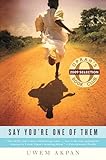 Contemporary priests who write recognize they must pass the highest stands of craft and storytelling before engaging the spiritual. I think of the excellent writing by priests at The Jesuit Post, the sharp cultural work of Fr. James Martin, SJ, known by many as the “Colbert Show chaplain,” and the fiction of Fr. Uwem Akpan, SJ. Born and raised in Nigeria, Fr. Akpan earned an MFA from the University of Michigan. His short fiction appeared in The New Yorker before being collected in Say You’re One of Them. He has noted that while not all priests are writers in the traditional sense, “there is no running away from the poetic and creative side of carrying the Word of God to His people.” Echoing Hansen, Fr. Akpan is drawn to fiction because it is “exploratory” and “not doctrinaire.” His description could apply to Outer Darkness, a “grounded take on exorcism . . . exploring everyday evil in an idyllic Midwestern town.” The show is currently in development from AMC, and is written and co-executive produced by Fr. Jim McDermott, SJ. These contemporary priest-writers follow in the lineage of 19th century British Jesuit Gerard Manley Hopkins, whose groundbreaking poetry intrigues believers and non-believers alike.
Contemporary priests who write recognize they must pass the highest stands of craft and storytelling before engaging the spiritual. I think of the excellent writing by priests at The Jesuit Post, the sharp cultural work of Fr. James Martin, SJ, known by many as the “Colbert Show chaplain,” and the fiction of Fr. Uwem Akpan, SJ. Born and raised in Nigeria, Fr. Akpan earned an MFA from the University of Michigan. His short fiction appeared in The New Yorker before being collected in Say You’re One of Them. He has noted that while not all priests are writers in the traditional sense, “there is no running away from the poetic and creative side of carrying the Word of God to His people.” Echoing Hansen, Fr. Akpan is drawn to fiction because it is “exploratory” and “not doctrinaire.” His description could apply to Outer Darkness, a “grounded take on exorcism . . . exploring everyday evil in an idyllic Midwestern town.” The show is currently in development from AMC, and is written and co-executive produced by Fr. Jim McDermott, SJ. These contemporary priest-writers follow in the lineage of 19th century British Jesuit Gerard Manley Hopkins, whose groundbreaking poetry intrigues believers and non-believers alike.
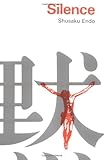
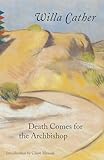
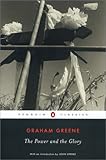 This cross-appeal may be why priests make such complex characters in fiction. Consider the priests in The Power and the Glory by Graham Greene, Death Comes for the Archbishop by Willa Cather, and Silence by Shusaku Endo, not to mention the novels and stories of J.F. Powers, Flannery O’Connor, and Erin McGraw.
This cross-appeal may be why priests make such complex characters in fiction. Consider the priests in The Power and the Glory by Graham Greene, Death Comes for the Archbishop by Willa Cather, and Silence by Shusaku Endo, not to mention the novels and stories of J.F. Powers, Flannery O’Connor, and Erin McGraw.
Priests and writers have much in common. Priests need to craft homilies that connect with an audience. These audiences range from the standing-room holiday crowds to the handful of daily congregants. A homily must simultaneously inform, entertain, and most importantly, serve as spiritual guidance and replenishment. Priests modulate between abstractions and specifics. They reach for the didactic without becoming pedantic. The celebration of Mass can be a grand ritual, the perfect antidote to a prosaic week, which makes poorly organized liturgical celebrations and flat sermons so obvious.
Even the most dedicated Catholics become uncomfortable in pews. Some are waiting to bring their daughters to soccer games. Others pine to watch football or stream Scandal. They have good intentions, but they offer both subtle and obvious cues when their attention is strained. A good priest will know the limits of his audience; a great priest will help them transcend those limits. He will show them the joy of this time spent together. As Thomas Merton said, “the deepest level of communication is not communication, but communion.”
I write for many of the same reasons that I wanted to become a priest. I want to bear witness to a sacramental vision. I want to admit my life as a sinner. Rather than judge others, I want to use empathy to sketch their imperfect lives on the page, and find the God that I know resides within them. Similar to the life of a priest, there is a space for silence in my writing life, but also a time of engagement with both reader and place.
I write from a Catholic worldview, but don’t often write about clergy or Catholic schools. Father Joe taught me that lesson, and thankfully, I listened. For me, writing is a form of prayer. I recognize that time spent at my desk can devolve into hours of selfishness, so I need to earn those words. Good fiction can be a form of good works. As a Catholic, I recognize that life is a story of continuous revision, of failure and unexpected grace, and of dogged hope. I am comfortable with the white space of ambiguity and mystery. I have faith, not certainty. To approach God in any other manner deflates the divine. I write and I believe in order to better see the world. Now, more than a decade after I left that rectory convinced I was meant to become a father and not a Father, a writer and not a pastor, I finally realize that I have not traded one vocation for another. I have discovered their common source.
Image via firstworldchild/Flickr








